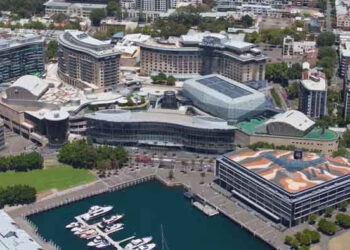Las Vegas Sands (NYSE: LVS) posted a strong second quarter on the strength of its expansive Macau resort portfolio, delivering net income of US$671.4 million on $3.62 billion in revenue, both double-digit increases over the same period last year.
More than 65% of the revenue, $2.38 billion, was generated in Macau, a 15% percent increase year on year, which was achieved despite some choppiness in the VIP segment, which was reflected in a 3.7% decline in gaming revenue in June, the first monthly drop in more than five years.
Sands’ Macau operations “delivered strong growth in the mass and non-gaming segments of our business” in the quarter, Chairman Sheldon Adelson said in a statement. “During the quarter, we again outpaced the market in terms of gaming revenue growth. Our gross gaming revenue was up 12%, versus a market that was up 5%.”
The company’s Hong Kong-listed Sands China subsidiary (1928.HK) generated adjusted EBITDA of US$800.6 million, missing a Bloomberg consensus of six analysts by about $56 million, but up 22% over Q2 2013.
A “significant drop in VIP revenue” was the reason, noted JP Morgan Chase analysts Cusson Leung. It’s a market-wide phenomenon currently that’s being attributed to a combination of macro-economic uncertainties in mainland China and the central government’s aggressive anti-corruption stance. It’s expected to continue as operators respond by shifting more table games into the more profitable cash sector and in particular to lucrative high-limit “premium mass” areas.
Union Gaming Research Macau estimates that Sands China was operating 148 fewer VIP tables in the second quarter compared with a year ago and 144 more mass-market tables, including 49 more premium mass tables, a 20% increase. The company’s current table mix stands at 377 VIP, 290 premium mass and 857 non-premium mass, the brokerage wrote in a client note.
“We continue to believe that all of the major infrastructure already put into place (and continuing to be put into place) in mainland China is driving a much-higher-quality customer to Macau, and driving them more frequently,” the firm said. “With this in mind, we would expect SCL to continually adjust its gaming and non-gaming mixes to suit its customer base.”
VIP volume was down 16% as a result, versus a market-wide decline of 6%. But mass table revenue growth outstripped the market (34% versus 32%), as did slots (+19% versus +4%). The difference was apparent in a 27% jump in net income to $620.2 million.
Operating income company-wide rose 23.2% to $961.5 million, due mostly to the stronger Macau results. Total net income was up 26.7%. Earnings per share increased 29.7% to 83 cents, missing a consensus of analysts polled by Thomson Reuters by 7 cents a share on forecasted revenue of $3.8 billion.
Marina Bay Sands in Singapore reported revenue of US$804.7 million, an increase of 8.8%.
The company’s two Las Vegas Strip resorts, The Venetian and Palazzo, combined for revenue of $353.1 million, an increase of 2.1%.
Sands Bethlehem continued to dominate Pennsylvania’s table games market with revenue of $177 million, a 7.2% increase year on year and far ahead of the $123 million taken in by second-place Parx Casino in the Philadelphia suburb of Bensalem.






























